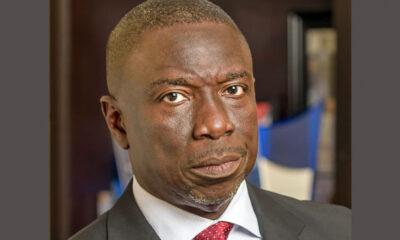Africa
JUST IN: South African highest court disqualifies Jacob Zuma from contesting election

JUST IN: South African highest court disqualifies Jacob Zuma from contesting election
South Africa’s highest court ruled on Monday that Jacob Zuma, the controversial former President now turned opposition figure, cannot run for parliament in the upcoming general election due to his prior conviction for contempt of court.
The decision, coming just days before the May 29th poll, is expected to anger Zuma’s supporters and raises concerns about potential unrest in the lead-up to the highly competitive election, the most fiercely contested since the end of apartheid in 1994.
Zuma had challenged the Electoral Commission’s decision barring him from running for a seat in parliament due to his conviction and subsequent imprisonment in 2021. Despite serving less than three months of his 15-month sentence, the court ruled that his conviction rendered him ineligible to stand for election, citing the constitutional provision disqualifying anyone sentenced to more than 12 months in prison.
Justice Leona Theron, delivering the judgment, stated, “This court concludes that Mr. Zuma was convicted of an offense and sentenced to more than 12 months imprisonment… and is accordingly not eligible to be a member of and not qualified to stand for election to the national assembly.”
Zuma’s absence from the ballot could significantly impact the dynamics of the election. In South Africa, the president is chosen by members of parliament, and without Zuma’s candidacy, his new political party would be unable to propose him for the presidency even if it secures enough seats.
READ ALSO:
- NSCDC uncovers fresh illegal refining sites in Rivers
- Ekiti selected monarch arraigned for certificate forgery
- Bandits abduct four family members, one other in Abuja quarters
Despite the setback, Zuma’s supporters, many of whom gathered outside the court wearing military attire associated with his party, remain determined to win sufficient seats in the National Assembly to potentially amend the constitution.
While opinion polls suggest limited support for Zuma’s party beyond his home province of KwaZulu-Natal, his followers express unwavering resolve. Lindiwe Mtshali, a member of Zuma’s party, voiced disappointment but affirmed confidence in the party’s remaining candidates, stating, “We are resolute.”
Neeshan Balton of the Ahmed Kathrada Foundation, which provided legal advice in the case, welcomed the ruling outside the court, emphasizing the importance of upholding the constitution for all candidates.
The exclusion of Zuma from the ballot could reshape the political landscape and force potential coalition negotiations. Furthermore, there are concerns that the decision may provoke unrest akin to the violent protests following his imprisonment last year, which claimed hundreds of lives.
Despite Zuma’s image already printed on ballot papers, his disqualification renders him ineligible for parliamentary membership if the court’s ruling stands.
JUST IN: South African highest court disqualifies Jacob Zuma from contesting election
Africa
Niger Republic rebel leader threatens new attacks

Niger Republic rebel leader threatens new attacks
Moussa Kounaï, head of the Patriotic Movement for Freedom and Justice (MPLJ) in Niger Republic, has issued a fresh warning of renewed hostilities against the government led by General Abdourahamane Tiani, threatening imminent strikes on the nation’s oil sector.
In a statement delivered from a remote desert location in northern Niger on Saturday, April 26, Kounaï accused the “Tiani cartel” of betraying the nation and pledged to prioritize attacks on critical oil facilities in what he described as a new phase of the rebellion.
“Our fight is for freedom and justice,” Kounaï said. “The exploitation of Niger’s resources by an illegitimate regime must be stopped.”
READ ALSO:
- Osun monarch, pastor plead guilty to $4.2m COVID-19 US fraud
- JAMB arrests 40 impersonators during UTME
- Napoli set €100m price tag on Osimhen amid Juventus interest
Although Kounaï did not detail specific targets or a timeline for the operations, he made it clear that oil fields and pipelines would be treated as “legitimate targets” in the campaign against what he termed “the usurpers in Niamey.”
Security experts have cautioned that a resurgence in rebel activity could deliver a significant blow to Niger’s already fragile economy, which is heavily dependent on oil revenues.
As of now, the Tiani administration has not officially responded to Kounaï’s threats.
Meanwhile, military patrols have reportedly been strengthened around key oil installations in the Agadem region, amid rising concerns about potential acts of sabotage.
Niger Republic rebel leader threatens new attacks
(Zagozola Makama)
Africa
Over 120 inmates escape prison in Chad shoot-out

Over 120 inmates escape prison in Chad shoot-out
No fewer than 120 inmates escaped a Chad prison during a shoot-out that left three people dead and wounded a state governor visiting the facility, officials told AFP.
The breakout occurred late Friday when an uprising happened in the high-security penitentiary five kilometres (three miles) from the town of Mongo, in the centre of Chad.
“There are around 100 who escaped, three dead and three wounded,” Hassan Souleymane Adam, secretary general of the Guera province in which Mongo is located, said.
READ ALSO:
- China warns countries against trade dealings with US
- Breaking: Pope Francis dies at 88 – Vatican
- Nigerian banks generated N14tn from loans – Report
- How Nigerian hotelier died during wife’s 60th birthday celebration
A local Mongo official, speaking to AFP on condition of anonymity, disclosed that prisoners broke into a manager’s office to steal guns.
“A shootout with guards ensued at the same time the governor arrived. He was wounded,” he said.
The Mongo official confirmed there were three killed and a total number of 132 prisoners escaped.
He disclosed that the prisoners revolted after complaining about a lack of food.
In a telephone chat with AFP, Chad’s Justice Minister Youssouf Tom stated that he was about to fly to the region and would be able to give “precise information once I am at Mongo in the coming hours.”
Over 120 inmates escape prison in Chad shoot-out
Africa
DR Congo boat fire kills 143 passengers

DR Congo boat fire kills 143 passengers
No fewer than 143 people died, and dozens more went missing after a boat carrying fuel caught fire and capsized in the Democratic Republic of Congo, officials said Friday.
Hundreds of passengers were jammed onto a wooden boat on the Congo River in northwest DRC on Tuesday when the wildfire broke out, according to Josephine-Pacifique Lokumu, head of a delegation of national MPs from the region.
The calamity struck near Mbandaka, the capital of Equateur Province, at the junction of the Ruki and the massive Congo River, the world’s deepest.
“A first group of 131 bodies was found on Wednesday, with a further 12 fished out on Thursday and Friday. Several of them are charred,” Lokumu told AFP.
According to Joseph Lokondo, a local civil society activist who helped bury the remains, the “provisional death toll is 145: some burnt, others drowned”.
According to Lokumu, the blaze was triggered by a fuel explosion sparked by an onboard cooking fire.
“A woman lit the embers for cooking. The fuel, which was not far away, exploded, killing many children and women,” she said.
READ ALSO:
- Speed Darlington alleges use of ‘Juju’ by Portable during celebrity boxing bout
- Speed Darlington alleges use of ‘Juju’ by Portable during celebrity boxing bout
- Davido eyes Nollywood, to invest in film projects
Videos circulating on social media showed flames leaping from a big boat stranded far from shore, smoke rising from the wreckage, and passengers on smaller vessels watching on.
The precise number of passengers on board the tragic vessel was unknown, but Lokumu estimated it to be in the “hundreds”.
Some people were rescued and admitted to the hospital, Lokondo added.
However, he said that “several families were still without news of their loved ones” on Friday.
The Democratic Republic of the Congo (DRC), a huge Central African nation spanning 2.3 million square kilometres (900,000 square miles), suffers from a shortage of passable roads, and planes serve just a few cities and villages.
As a result, people frequently travel on lakes, the Congo River (Africa’s second longest river after the Nile), and its winding tributaries, where shipwrecks are common and mortality tolls are high.
The persistent lack of passenger lists frequently hinders search activities.
In October 2023, at least 47 people perished when a boat travelling the Congo sank in Equateur.
According to local authorities, a boat sank on Lake Kivu in eastern DR Congo in October of last year, killing more than 20 persons.
Another shipwreck on Lake Kivu killed approximately 100 lives in 2019.
DR Congo boat fire kills 143 passengers
-

 metro1 day ago
metro1 day agoTruck falls from Lagos bridge on two buses
-

 metro22 hours ago
metro22 hours agoHow Access Bank staff secretly filmed 400 colleagues naked in office
-

 Education2 days ago
Education2 days agoJAMB officials seize candidates’ hijab at Caleb varsity, Muslim students kick
-

 metro2 days ago
metro2 days agoOmokri : How Tinubu’s political mastery started with Abiola, says El-Rufai, Obi’s forces can’t stop him
-

 Entertainment4 hours ago
Entertainment4 hours agoKollington fires back at Wasiu Ayinde K1
-

 International2 days ago
International2 days agoUS releases 41 countries granted 90-day entry without visas (full list)
-

 metro23 hours ago
metro23 hours agoDSS arrests British Army Officer, others, seizes 57 AK47
-

 metro2 days ago
metro2 days agoGroom cancels wedding, marries another lady same date, venue













